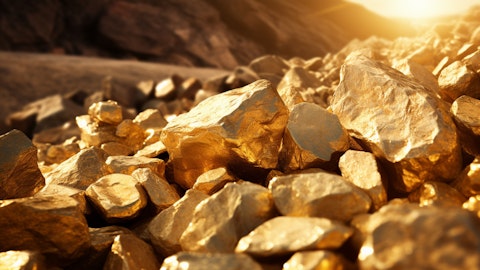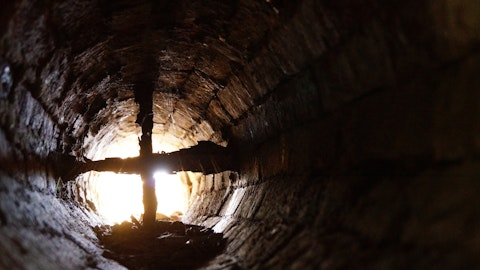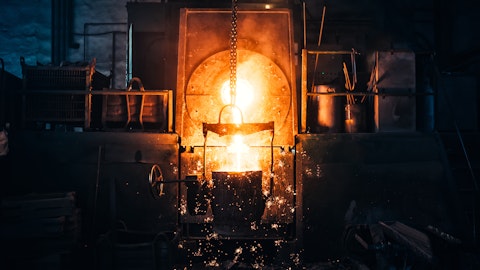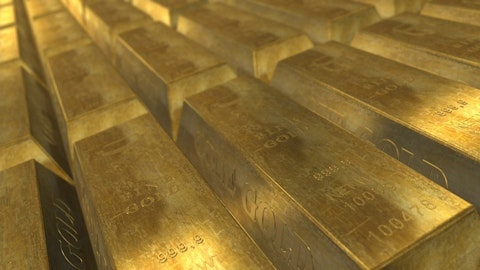Marian van der Walt : Yes, I may add, Rene, is that we do have the kind of support systems now that can be in actual fact, when we do the declines in any case, we don’t do it under distressed areas. So we do have a support regime to in actual fact support that. So we also — there’s obviously one of the biggest, biggest concerns was to do we have the capabilities and management of seismicity in these deep level mines? And Mponeng’s seismic activity over 1,000 square meters per 7 square meters mine, the seismic release rates actually came down because of the configurations were used. The pillar configurations — The pillar configuration we currently use the lease and lags that we manage, the support systems that we put in, the quality of backfill that improved over years.
And then obviously, also the steel nets that we currently have in all our working places. So we think we’ve got — we’ve really got the state of the art and the understanding and the know-how to do this. And that is what we make our specialists in this environment, specifically there. So — and we have a very strong track record of seismic management since army took over there. And even prior to that, the work at [indiscernible]. So we are very comfortable that we tick that box as far as safety is concerned.
A –Unidentified Company Representative: Peter, thank you and Jared, again, I’m just going to ask Boipelo. We’ve been asked by Arnold Sankaran. — just to chat a little bit about stream coming to an end at Mine Waste Solutions and what that would do to the free cash flow. And then — while we’re addressing questions to you, there was a question which has since disappeared. Just the IRR that was assumed for the Mponeng extension and specifically also the gold price that was used in finalizing that feasibility study, please?
Boipelo Lekubo: Sure, Marion. So from Mponeng gold price was ZAR 1.1 million a kilogram, the IRR at 17%. Yes. And then just on the first question with regards to the stream, I think that adds about its 25,000 ounces that remain, and that will add about ZAR 700 million to revenue.
A –Unidentified Company Representative: Thanks, Boipelo And perhaps just the last question for Asia in Johannesburg, and then we’ll hand over to Miami again that all feels quite multinational. And I ask this question is a tough one, but I’m going to ask you, this is from Chris Nicholson at RMB — he wants to know gram per-tonne costs were at 22%, Chris, but I’m sure you’ve seen that our all-in sustaining cost is coming down gram per kilogram, if you noticed, it’s actually moving towards the left of that graph just saying. So the gram per tonne on costs were up 2% year-on-year at the South African underground with the South African underground assets, 14% at SA overall. Could you comment on this high level of inflation? And what do you expect the gram per tonne inflation to run at into 2024?
Jared Hoover: Thank you for the question, Chris. So Harmony has always targeted improvement in our grade to help us manage inflation. And so we’re not immune as the other mines to inflation. And the key drivers of higher-than-normal inflation were, in fact, in our electricity costs in South Africa. That number increased by 19%. So which obviously added to the gram per tonne inflation number. The other one that was slightly elevated, although we believe it’s well understood, and it’s fairly manageable for us on our long-term agreements is our wage number. So South African wage is escalated by 9% over the period. And then the third one, which we made mention in the bucket as well as royalties, which was actually quite a significant increase. So those were the ones that stood out. But obviously, we continuously managing our production in a consistent predictable production as well as improvement in grades to help us manage inflation.
A –Unidentified Company Representative: Thank you, Jared. We’ll hand over to you and Peter in Miami, should there be any further questions…
Peter Steenkamp: But nothing on this side. I don’t know if there’s anything on the line on Chorus Call store that’s potentially coming through.
Jared Hoover: We have no further questions on the conference call.
Peter Steenkamp: Yes. And then maybe I could just wrap it up there. If that’s okay, Jared. I just thank you, everybody, for calling in today. It’s an odd time for actually South Africa to do it in the afternoon, but it’s early morning here. There’s a wonderful sunrise here with impending ocean that we witnessed out of our room. But fantastic to have you guys here. Looking forward to come back to South Africa at the end of the week. And yes, thanks again for dialing in. We appreciate that.
Follow Harmony Gold Mining Co Ltd (NYSE:HMY)
Follow Harmony Gold Mining Co Ltd (NYSE:HMY)
Receive real-time insider trading and news alerts





